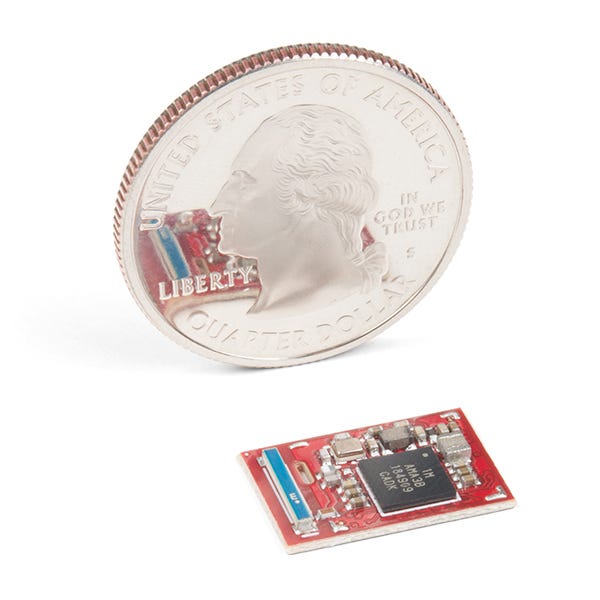The Artemis Engineering Version from SparkFun is an open-source embedded system module designed to run TensorFlow for hobbyist and consumer-level projects.
July 3, 2019
|
The Artemis Engineering Version measures 15.5 x 10.5-mm and is capable of running TensorFlow with low power consumption (Image source: SparkFun) |
More and more options are becoming available to makers and engineers looking for low-cost solutions for bringing machine learning and artificial intelligence to their projects.
The latest offering, the Artemis Engineering Version from SparkFun Electronics, is an open-source embedded systems module targeted specifically at bringing the Google-developed TensorFlow machine learning software library to makers, developers, and researchers. The Artemis Engineering Version aims to be a one-stop shop for machine learning developers moving from hobby to consumer product. SparkFun says the module is designed with consumer products in mind and differentiates itself from the Arduino and similar offerings by being built to scale up.
“Our goal is to enable anyone to integrate low-power machine learning into their designs and projects without being locked into a specific toolchain,” Nathan Seidle, founder of SparkFun said. “The Artemis module is the first product to bridge the gap between hobbyists and consumer products, providing a single module from prototype to production.”
The 15.5 x 10.5-mm Artemis module runs on an ARM Cortex M4F processor with built-in Bluetooth Low Energy 5.0. According to SparkFun's specs, the Artemis can run machine learning algorithms with a low current consumption of 6μA/MHz at 3.3V. It is also fully compatible with SparkFun's Arduino core and can be programmed using the Arduino IDE. It also includes Qwiic connectors for integration with the Qwiic ecosystem of sensors, outputs, and controllers. Users who want to implement more professional tools can take advantage of the Artemis' JTAG connector. The module also features 2-layer PCBs and 8mil trace/space.
And on top of all of this the module is open source. SparkFun has made the design files freely available on GitHub and the company has released three open-source hardware example products that can act as starting points for various projects.
RELATED ARTICLES:
SparkFun has made three carrier boards available for the Artemis – the Blackboard Artemis, BlackBoard Artemis Nano, and Blackboard Artemis ATP. The Blackboard Artemis comes in the Arduino Uno footprint and is intended as an entry point for working with the module. The Artemis Nano, true to its name, is the smallest of the three boards and is aimed at creating smaller-sized projects. The Blackboard Artemis ATP (All the Pins) opens up the full capabilities of the module by breaking out all 48 of its GPIO.
The Artemis is the latest in a trend of products targeted at bringing machine learning to embedded developers. The new Raspberry Pi 4 is targeted at Industrial IoT applications and comes with specs comparable to a desktop computer --- all of which should go a long way in enhancing the Raspberry Pi's capabilities as a platform for developing with AI.
On the pricier end, earlier this year, GPU-maker Nvidia debuted the Jetson Nano, a version of its Jetson computing platform targeted more at the maker community and those looking to develop lower-cost robots and other smart devices.
Writing for Design News, embedded software consultant Jacob Beningo has noted the growing impact machine learning is having on the embedded space. “Machine learning offers the opportunity to provide embedded software developers with new tools and technologies that have the potential to ease development costs and off-load some of the programming workload,” Beningo wrote “Machine learning is also opening up new potential applications and features that will forever change how users expect their systems to behave. While machine learning is just finding its way to the embedded space, it’s coming faster than many may realize.”
The Artemis Engineering Version is currently available through SparkFun. Note however that the module has not received FCC compliance and certifications as of this writing. SparkFun has said it is actively seeking FCC approvals for the module and will be releasing shielded modules in tape-and-reel quantities once this happens.
Chris Wiltz is a Senior Editor at Design News covering emerging technologies including AI, VR/AR, blockchain, and robotics.
Drive World with ESC Launches in Silicon Valley This summer (August 27-29), Drive World Conference & Expo launches in Silicon Valley with North America's largest embedded systems event, Embedded Systems Conference (ESC). The inaugural three-day showcase brings together the brightest minds across the automotive electronics and embedded systems industries who are looking to shape the technology of tomorrow. |
About the Author(s)
You May Also Like





